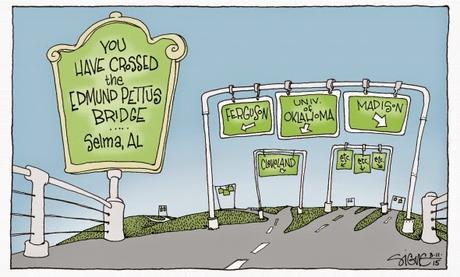
Something else gaining attention in this week's news: Madonna's statement,
Gay rights are way more advanced than women’s rights. People are a lot more open-minded to the gay community than they are to women, period.
I've found Alex Berg's and Michelangelo Signorile's responses to Madonna particularly helpful. As Berg notes, what Madonna has said will inevitably evoke, for many listeners, echoes of Patricia Arquette's comments to reporters following the Oscars a few weeks ago. Arquette said,
And it's time for all the women in America and all the men that love women, and all the gay people, and all the people of color that we've all fought for to fight for us now.
As one commentator after another has noted, this playing of women's rights against gay rights and the rights of people of color, with its suggestion that the LGBT and African-American community have "made it," while women are being held back, is disturbing on a number of fronts. First, there's the fact that, as Berg notes, "Gay people are women, too."
And there's the fact that women are people of color, too, Berg points out. And, finally,
Now, let me really blow your mind: There are LGBTQ WOC.
As Berg concludes, Madonna has been a trailblazer and a staunch advocate of LGBT rights. But:
But, in the wake of events in Ferguson and Staten Island that have brought national attention to the systematic policing and government sanctioned violence against people of color, bills in state legislatures that are seeking to legalize LGBTQ discrimination on the basis of religious beliefs and the climbing number of murdered transgender women in 2015, comparing how things have "moved along" for one identity over another is willfully ignorant. For those of us who count membership to multiple groups, these challenges to our freedom and equality are amplified and complicated by our intersectional identities.
As Signorile points out, Madonna's comment seems to imply that gay folks have already achieved victory in their struggle for rights — and it overlooks the fact that women enjoy federal protection from discrimination in areas of employment, housing, medical services, etc., while LGBT citizens do not have such protection, just as it overlooks the fact that in 29 states, no laws whatsoever protect LGBT citizens from such discriminatory abuse.
What Madonna and Arquette succeed in doing, Signorile points out, even if they do not intend to do this, is playing LGBT (and black) rights against women's rights in a way that gives aid and comfort to the shared enemies of all three groups:
If we don't learn the lessons from the past, victory blindness too will allow the enemies of LGBT equality to do what they've done to successes not only for women but for people of color and so many other groups. Madonna doesn't mean to do it, but her words serve to divide us when she could be underscoring how all of us who are marginalized are experiencing backlash by an angry, irrationally fearful force among the American people -- a force fueled by bigotry and which has helped consolidate power among the few for a long time.
As Brynn Tannehill has recently noted, after the GOP sweep of the 2014 elections, it is starkly apparent that LGBT citizens of the U.S. live in two distinctly different Americas — and the nation intent on attacking LGBT folks is, following last fall's elections, now doing everything in its power to extend such attacks in the grossest, most vicious way possible:
LGBT Americans live in one of two distinct political environments, with very little in-between. We are either full citizens, or are left completely at the whims of the multitudes who would do us harm.
States either offer a host of protections, or they offer very few. The most recent in-depth study of transgender rights looked at state level conditions for transgender people in the US. It clearly showed the gap between our two Americas.
And:
The result of this widening gap will be an America where more than half the country can marry the person they love, but also be fired, denied housing, refused health care, denied service, and refused public accommodations because they got married in the first place.
Culturally, though, it is already far too easy for people living in states where they live with acceptance and legal protections to forget that this is the exception rather than the rule. When singer Kelly Clarkson was asked about her lesbian and gay fan base, she remarked, "I think it's silly that we're still talking about gay rights. I just live in this world where people are accepted, so it's very hard for me to even realize that that still exists. It's hard for me to wrap my brain around it."
As someone living in one of the evangelical-dominated bible-belt states in which "no cake for queers" bills are now being filed hot and heavy by people representing "Christian" values of homophobic hatred, exclusion, and discrimination, I take what Tannehill says to heart. And I'm baffled by the suggestion of prominent members of the performing arts community like Madonna and Patricia Arquette that gay folks have somehow made it in American society, and that the success of gay rights in the U.S. has overshadowed the struggle for women's rights.
In the part of the U.S. in which I live, it's perfectly clear that the rights of women, African Americans, and gay folks are all under attack. And that if we do not stand together, we will fall together. And that part of the world represents a good portion of the whole union, so that it's mind-bogglingly self-deluded for people in the more "enlightened" parts of the country to imagine that these attacks on all three groups are not part of their own problems, too.
The graphic is a cartoon by Clay Bennett at Truthdig.

